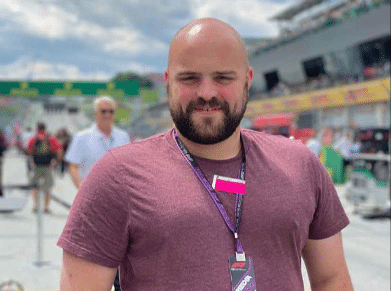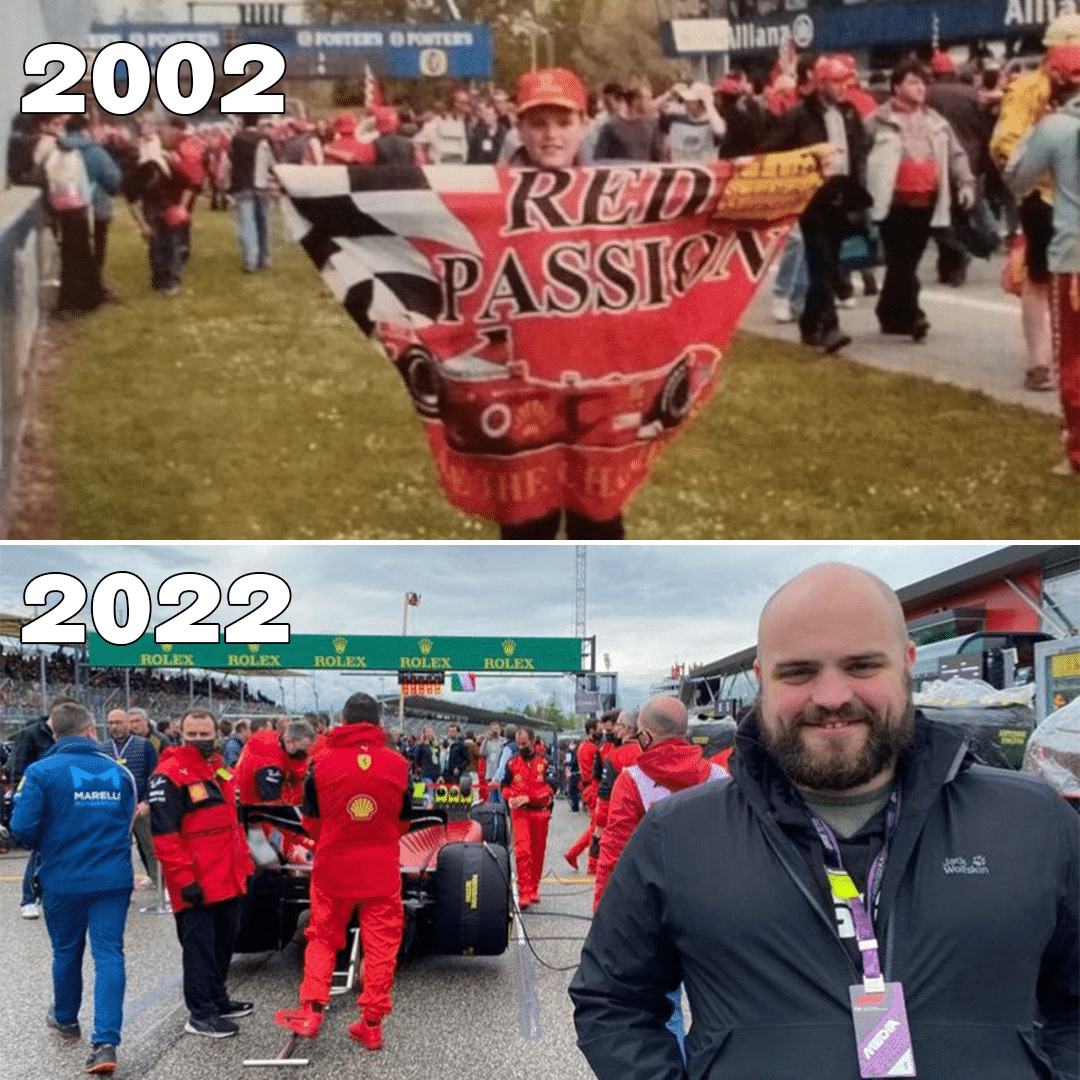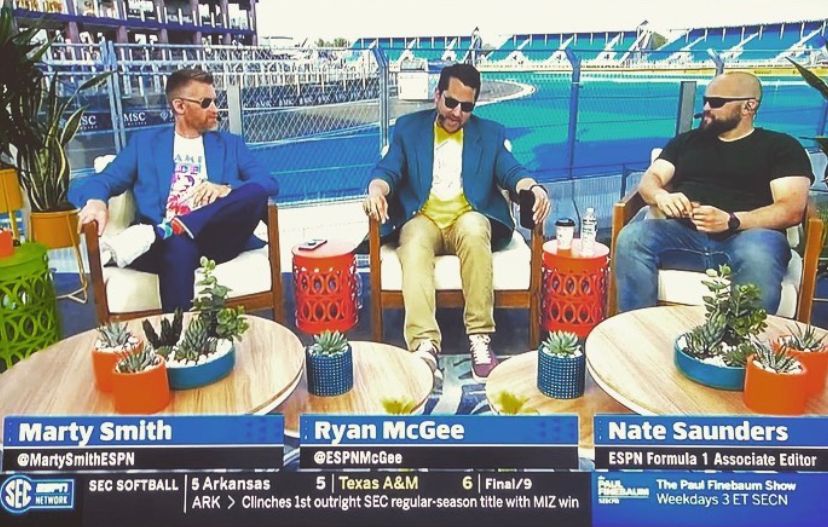

INSIGHTS
Nate Saunders – Motorsport Journalist, ESPN
“You have to be careful not to get caught up in the rush to get a story out…there’s no benefit to being the first to break news, you’re just trying to tell a human story.”
Nate Saunders is a Formula 1 reporter for ESPN, where he has worked since 2014 and attended races regularly since 2016. In 2018, Nate wrote a book on Daniel Ricciardo called ‘in Pursuit of Greatness’, cover to cover of photos of Ricciardo driving for Red Bull. He likes to joke the book was officially relevant for a day, as 24 hours after it was released Ricciardo announced he was moving to Renault.
Nate is a part of ESPN’s Unlapped podcast and also features on the Pad-Hoc podcast with fellow F1 journalists Chris Medland and Lawrence Barretto. He also wrote episodes on Dale Earnhardt and Bruce Lee for the Crowd Network podcast ‘Death of a Sports Star’ in 2020.
SMG sat with Nate during the Formula 1 United States Grand Prix 2022 in Austin, Texas to discuss his journey to the world of motorsport.
Where it all began
My dad is half Italian. I’m English but when it came to choosing a side when watching sport I was always conflicted between supporting England or Italy. I decided to go with England when it came to football and rugby, but Dad drew the line at Formula 1: It was Ferrari or nothing!
Obviously in the 90s and early 2000s Schumacher was dominant, so I used to watch all the races and I just loved watching our team win. My dad and I went to Imola in 2006 and we officially became part of Ferrari tifosi.
As a kid, I also really liked writing. I remember I once got in trouble because I stole all the little exercise textbooks from school. My mom found them all, full of made-up sports stories I had written, like I was already a sports journalist. She didn’t really tell me off and when she told my teachers why I stole them they all instead encouraged my writing. Naturally, my love of F1 and writing came together, and I’d write made up race reports. I was always in the middle of it … “Ferrari’s Nate Saunders wins again” being a regular headline. There was obviously a bit of an ego there!
My role in 10 words or less
Editorial. Comment. Building contacts. Breaking news. Talking nonsense (just kidding!)
Why what I do is important
Sport is a release from daily stresses for a lot of people and they like reading about it as much as they like watching it. If you didn’t have journalism with sport there would be no connection to the athletes or what’s happening.
I think it’s important as well because, especially nowadays, there’s so much disinformation. Journalists are there on site talking to drivers and team bosses. They are getting the information directly from the source unlike the person back home tweeting stuff from their sofas.
Ultimately, journalism helps the integrity and enjoyment of sport for those consuming it.
My first race
Imola in 2002. Schumacher won, we got onto the track and everyone was going crazy! It was so great and the perfect first race.
There’s a picture of me holding a Ferrari flag on the grid that recreated when I returned for work this season, 20 years later, and instead wearing my media pass. I sent it to my dad who told me he got a bit choked up seeing it. That was cool.

My most challenging moment
When Hubert had his accident and passed away in Spa 2018. I was working back at the office when Bianchi had his crash in Suzuka so this was the first time I had experienced an incident like this on the ground. It’s very different. On the one hand, you’re a journalist reporting news. You have to go through the motions to a certain degree. But then on the other, it’s a horrible story and situation and you would rather be anywhere else.
You have to be careful not to get caught up in the rush to get a story out there. You have the pressure of being asked for updates that you just don’t have from those in the office as well as needing to talk to other people in the paddock. It’s difficult to navigate it because ultimately you don’t want to be in that situation, there’s no benefit to being the first to break news, you’re just trying to tell a human story. That was by far my most challenging moment.
”Journalists are there on site talking to drivers and team bosses. They are getting the information directly from the source unlike the person back home tweeting stuff from their sofas.
Nate SaundersMotorsport Journalist, ESPN
My Proudest Moment
Miami 2020. I went on an ESPN’s Marty & McGee, which is a show I’ve always loved. A few years ago, doing something like that would make me feel so uncomfortable; I never really liked being in front of the camera let alone doing it live. But I really enjoyed it. I’m pretty certain I sent photos to everyone I know! I had cracked America!

An F1 Memory I’ll Never Forget
The 2008 Brazilian Grand Prix when Hamilton won his first world championship. I was watching at university, and by this point, Schumacher was gone and the Hamilton hype in the UK was huge. Everyone at my University wanted Hamilton to win and we went mad, jumping around, yelling, cheering! I can see Hamilton passing Glock and hear Brundle shouting on the commentary, and it still gives me goosebumps.
How I’ve worked with SMG
I’ve worked with SMG a few times over the years, mainly doing interviews with key people within the promoters. Most recently, I spoke to Bobby (Epstein, Chairman and Founder of Circuit of the Americas) on our Unlapped podcast during the USGP weekend which was arranged through SMG. I really enjoy helping hype up a race – it’s a big part of the job!
My Advice for Aspiring Journalists
Write as if you’re writing for somebody to read down the pub. You don’t talk about boring, dry subjects when with your friends down the pub, usually you talk about human drama and issues. When I write, even with the driest subjects, I think: “How would I talk to my friends about this on a night out or over a pint?”
For those trying to get into journalism, get as much work experience as you can and not just in one area (eg. Motorsport). Explore lots of different areas because the one thing that employers love is seeing variety and versatility. For example, I once covered Crufts, the international dog show. I had no desire to work in that area of journalism, but this was when I was freelancing. I remember interviewing all these old ladies with dogs, thinking what am I doing? But when I told ESPN about this experience during my interview, they thought it was amazing. It just shows that your whole life doesn’t revolve around this one thing and you understand the world is a bigger than your passion.
